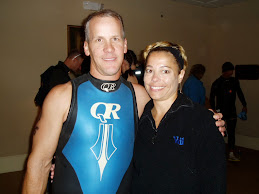Here I was last year, a nephite to the whole Tri training season. Reading plenty of articles and books, mostly by my friend Joe Friel, plenty of others chime in, but most follow his advise with a few modifications here and there. So what did I learn last year. I learned to rest when my body said rest! Last year I was pushing my BASE training hours up to the 18 hours per week. Of course back then I was not as fit as I am today so this year an 18 - 20 hour week puts in many more miles than it did last year. However, that is not the important part - miles that is. The core idea is to train consistantly pushing yourself up to a limit and then back off some and then do it again. This happens on 3 levels a Micro (Weekly scale) you schedule a tough day, or maybe two followed by an easier day or even a off day depending on your fitness level. The next level is the Macro "monthly" cycle which has you add to your training for 3 straight weeks and then back off on the 4th week. Finally there is the seasonal cycle which has you do longer (Less intense training) during the off season followed by shorter (More intense) training during the racing season. Of course this is VERY VERY basic but gives the overall understading of how to lay out your training. Most people beleive it is about how many miles you run or ride. However you have to rememember everyone is different, has different goals and have different levels of fitness. A 6 mile run for some is considered a "long Run" while for others it would be considered an easy run - even if done at an intenese pace. That is why it is best to represent and record your trianing volumes in hours instead of miles. An 80 mile bike ride for me in very windy conditions could take 6 hours verses an 80 mile ride with a group and no wind easily 4 hours. Last year I was training hard and trying to get better, all the time wondering - HOW to train better, quality not quantity, that is the key! Anyone that wants to do well in Triathlons is usuaully a pretty motivated person, so that is rarely the problem. In fact, we are usually so motivated it sometimes presents a problem. Last year I had two straight 18 -20 hour weeks plus normal family and work related activities makes for a lot of training. (My guess is anyone that works full time will struggle with any more than this, maybe an epic week here and there but 20 hours is a pretty loaded week for most, only professional can honestly build a 30+ hour week routinely.) This was a lot and the first time I had aapproached that level, everything was fine the first two weeks however, on the 3rd week I started feeling VERY tired and dragged my butt out of bed and forced my way through every workout, as prescribed in my SELF training schedule, I finally took my recover week the following week backing my training down to a more sensible 11 hour week. One week later I was ready to go again. I pumped out a couple more 20 hour weeks, increasing millege once again. Again I struggled through the 3rd week and then took a rest.
This year I just finished 3 BASE II weeks of 20 hour weeks of training, each progressively harder and farther than before. Bingo I start to go into my fourth week (Lucky for me a recovery week) and BAM! I feel no motivation, legs are tired. I learned from last year what this meant - TAKE a REST! Who cares what the training program says. Your body cannot read a program! Now you know why the experts like Joe Friel says to recover every 4th week, becasue for most people the timing just works out this way. But if you are listening to your body this could happen at 3 weeks (Like it did for me last year)or maybe you can push it out to 4 or 5 weeks (I am going to try that in BASE III) wiht an EPIC week somewhere in there as well, you simply have to learn how to listen to what your body is telling you and understand that rest is good. You definately have to push yourself out of your comfort zone to get better but you also have to rest to get the benefit. If you never take this rest you essentially will never get the fitness gain from all the work you just did. As you get more and more fit, this becomes a finer and finer line, you have to push past your confort zones but not too far. Essentially the ONLY person that can really know this is YOU, most coaches cannot read your mind, your motivation. they might could look at hear rate or something like that and see if is unusally high but no one will understand your body like you do. A lot of very motivated athletes actually are training in an over training state most of the time and would probably benefit more from looking at their recovery cycles and adjusting those to better match their tough sessions. However, that is hard to tell someone who is just plain motivated to win! They always think more is better, they also always think more intense work is better, again not necessarily. For some of you, I am simply preaching to the choir but heck it does not hurt to send out a little reminder now and then. We are all so motivated to do well we simply forget sometimes to stop and listen to what are bodies are saying. I think the best lessons sometimes come from just years of training and learning the "hard way" CRASH and BURN! - but it does not have to be, those who learn to listen to their bodies ultimately perform at their best (This may not be a win) but it will be "their" best and that is what really counts. So don't forget to rest - besides I get pretty damn grumpy when I am tired and do not want to train, at least that is what my wife tells me. Trust me she is always right!
Tuesday, January 16, 2007
Subscribe to:
Post Comments (Atom)












No comments:
Post a Comment